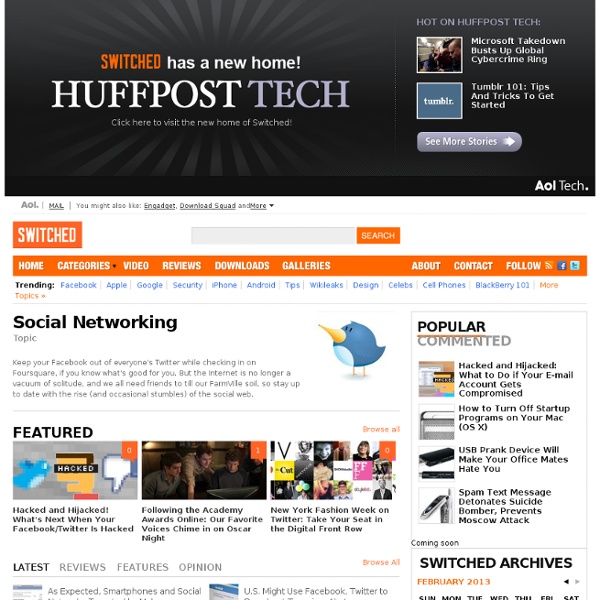



http://www.switched.com/category/@socialnetworking
White Paper Information Architecture Glossary Information Architecture Glossary By Kat Hagedorn, Argus Associates March 2000 This glossary is intended to foster development of a shared vocabulary within the new and rapidly evolving field of information architecture. It should serve as a valuable reference for anyone involved with or interested in the design of information architectures for web sites, intranets and other information systems.
Folksonomies - Cooperative Classification and Communication Through Shared Metadata The Creation of Metadata: Professionals, Content Creators, Users Metadata is often characterized as “data about data.” Metadata is information, often highly structured, about documents, books, articles, photographs, or other items that is designed to support specific functions. These functions are usually to facilitate some organization and access of information. Administrative, structural, and descriptive metadata are three broad categories of metadata (Taylor, 2004).
Participatory Media Literacy / Participatory Media Literacy Guide To This Site's Contents Welcome to Participatory Media Literacy (Home)BloggingWikiRSSSocial Bookmarking, Tagging, Music/Photo/Video SharingPodcastingVideo BloggingDigital Video ResourcesDigital StorytellingMashupsChat: Channeling the BackchannelTransliteracyForecasting: Thinking long term, developing foresight Participatory Media Education Resources Recent technological changes have made much wider social changes possible: Until the end of the twentieth century, only a relatively small and wealthy fraction of the human race could broadcast television programs, publish newspapers, create encyclopedias; by the twenty first century, however, inexpensive digital computers and ubiquitous Internet access made the means of high quality media production and distribution accessible to a substantial portion of the world's population.
Web 2.0 World Wide Web sites that use technology beyond the static pages of earlier Web sites A tag cloud (a typical Web 2.0 phenomenon in itself) presenting Web 2.0 themes Web 2.0 (also known as Participative (or Participatory)[1] and Social Web)[2] refers to websites that emphasize user-generated content, ease of use, participatory culture and interoperability (i.e., compatible with other products, systems, and devices) for end users.
Public could help BBC to index archive Pilot project allows listeners to add searchable keywords to audio programmes The BBC could ask listeners to write programme information about its radio news bulletins in order to make its vast archives more accessible to future generations of licence payers. Under the Annotatable Audio project, radio listeners would be able to mark and add descriptive keywords to segments of programming they want to flag for bookmarking or sharing with others. It means they could highlight a specific item within a lengthy bulletin stream and return to that particular point later.
Rethinking Community Documentation by Andy Oram 07/06/2006 A new era is halfway here, and nobody has recognized its impact--even though we've all participated eagerly in its arrival. The way we educate ourselves to use and program computers is shifting along many of the same historic lines as journalism, scientific publication, and other information-rich fields. Researchers have pounced on those other trends, but computer education remains short on commentary. MeatballWiki Once you are comfortable, sign our guestbook, RecentVisitors, with your real name and then create your very own homepage. If this concept seems crazy, see WhyWikiWorks and WikiFaq. [Hipnoterapi Surabaya] Before you join, there are three major policies you must agree to: JoshuaRodd -- Fri Mar 9 20:56:00 2012 UTC
Previous Spotlighted Links 10 Usability Heuristics for User Interface Design April 24, 1994 | Article: 2 minutes to readJakob Nielsen's 10 general principles for interaction design. They are called "heuristics" because they are broad rules of thumb and not specific usability guidelines. When to Use Which User-Experience Research Methods October 12, 2014 | Article: 8 minutes to readModern day UX research methods answer a wide range of questions. To know when to use which method, each of 20 methods is mapped across 3 dimensions and over time within a typical product-development process. Usability 101: Introduction to Usability January 4, 2012 | Article: 4 minutes to readWhat is usability?
The Need for Creating Tag Standards at The NeoSmart Files Web 2.0, blogging, and tags all go together, hand-in-hand. However, while RPC standards exist for blogs and the pinheads boggle over the true definition of a “blog,” no one has a cast-in-iron standard for tags. Depending on where you go and who you ask, tags are implemented differently, and even defined in their own unique way. Even more importantly, tags were meant to be universal and compatible: a medium of sharing and conveying info across the internet — the very embodiment of a semantic web. Unfortunately, they’re not.
Life With Alacrity: Tracing the Evolution of Social Software The term 'social software', which is now used to define software that supports group interaction, has only become relatively popular within the last two or more years. However, the core ideas of social software itself enjoy a much longer history, running back to Vannevar Bush's ideas about 'memex' in 1945, and traveling through terms such as Augmentation, Groupware, and CSCW in the 1960s, 70s, 80s, and 90s. By examining the many terms used to describe today's 'social software' we can also explore the origins of social software itself, and see how there exists a very real life cycle concerning the use of technical terminology. 1940s — Memex
You’re It! » Blog Archive » Peter Morville: the Tagsonomy interview Last week I got the chance to talk to Peter Morville about his recent article Authority, his excellent new book Ambient Findability, and the future when everything will be taggable. As usual Peter has some provocative ideas. I’ve asked him to watch the comments here, so feel free to post your comments or ask questions. Gene: How is authority related to findability? Peter: My authority article stirred up a fascinating discussion on Web4Lib centered around this question. Historically, librarians have been comfortable with the notion that the most frequently cited academic papers (and their authors) are also the most popular, findable, and authoritative.